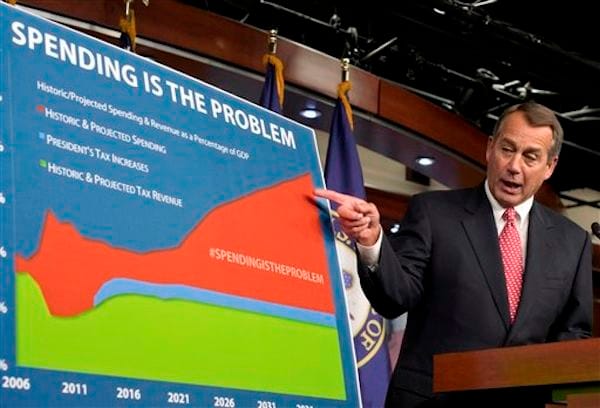Does Budget Sequestration Work?

Credit: AP

The Budget Control Act of 2011, the center of the current fiscal debacle, was passed in August of last year as a way to ensure that Congress substantively address the budget crisis by the end of 2012. The bill established sequestration cuts to occur from 2013 to 2021 if deficit reduction goals weren't met.
These cuts are set to come out of the non-exempt defense budget (9.4 percent, $55 billion) as well as programs like Medicare (2 percent, $11 billion), and social programs (between 7 to 8 percent, about $43 billion), but will the sequestration do enough to slow or even reverse the deficit? Does budget sequestration work?
Auburn University's Paul Johnson defines budget sequestration as,
“an amount of money equal to the difference between the cap set in the Budget Resolution and the amount actually appropriated is "sequestered" by the Treasury and not handed over to the agencies to which it was originally appropriated by Congress.”
The last time Congress faced the threat of sequestration cuts in the budget was 1985. Senators Phil Gramm (R-Texas), Warren Rudman (R-New Hampshire), and Ernest Hollings (D-South Carolina) introduced and passed the Emergency Deficit Control Act of 1985, wherein they outlined automatic-spending cuts in defense and domestic spending programs to take effect if a declining annual goal of lowering the deficit wasn’t reached.
The bill was marketed as a necessary evil to reduce the nation’s mounting deficit, which had become the largest in history. The practice of setting budget targets with teeth to enforce their fruition was a scary prospect for lawmakers and the budget quickly became a top priority.
The Supreme Court case, Bowsher v. Synar, found the act to be unconstitutional in 1986, on the grounds that it violated the separation of powers outlined in the first and second Articles of the US Constitution. A similar version of the bill, the Balanced Budget and Emergency Deficit Control Reaffirmation Act of 1987, passed the next year, raised the debt ceiling, and deficits continued to rise.
Ultimately, the sequestration legislation failed to reign in mounting deficits.
Though its immediate effects were negligible, a silver lining to Gramm-Rudman can be found in the Budget Enforcement Act of 1990. By creating a sense of immediacy and urgency with respect to the budget, George H.W. Bush and Congress were pressured to pass the massive deficit-reduction package, setting the stage for arguably, one of the most prosperous decades in recent memory.
If history is any indicator, the strategy of sequestration will fail to have any substantive effect on reducing the deficit in the long run. Yet it could pave the way for budget reform not too different from that of 1990. It remains unlikely that Washington will reach such an agreement this year. Still, lasting budget reform could be just a few years away.



